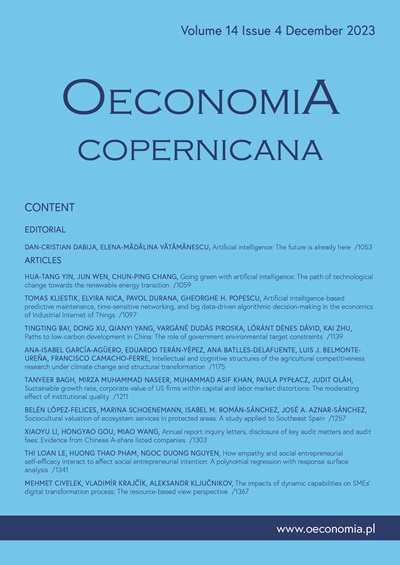Segmentation of e-customers in terms of sustainable last-mile delivery
IF 7.6
1区 经济学
Q1 ECONOMICS
引用次数: 4
Abstract
Research background: A rapidly developing e-commerce market and growing customer expectations regarding the speed and frequency of deliveries have made the last mile of the supply chain more challenging. The expectations of e-customers increase every year. They choose those companies that deliver goods faster and cheaper than others. A significant group of customers in Poland still selects home delivery. Many of them frequently return products to the retailer. These expectations and behaviour pose a challenge for the transport companies to deliver parcels to individual customers soon after the purchase, sometimes even on the same day. In addition, increasingly frequent deliveries contribute to environmental pollution, congestion, and accidents, as well as more expensive deliveries. Purpose of the article: The paper aims to identify e-customers? preferences and assess their impact on sustainable last-mile delivery (LMD) in the e-commerce market. The authors have also identified factors influencing e-customers? behaviour to make last-mile delivery more sustainable. Methods: The conjoint analysis was applied to evaluate a set of profiles defined by selected attributes in order to investigate the overall preferences for the profiles created by the respondents to the survey. Findings & value added: The segmentation of e-customers according to their preferences connected with last-mile delivery was presented. The added value of the paper is the presentation of the methodology to assess the impact of customer preferences on sustainable last-mile delivery. The obtained results may contribute to the formulation of recommendations for e-commerce and logistics companies regarding the preferences of e-customers to improve the sustainability of last-mile delivery.可持续最后一英里交付方面的电子客户细分
研究背景:快速发展的电子商务市场以及客户对配送速度和频率的期望越来越高,使得供应链的最后一英里更具挑战性。电子客户的期望每年都在增加。他们选择那些交货速度更快、价格更便宜的公司。在波兰,仍然有相当多的客户选择送货上门。他们中的许多人经常把产品退回给零售商。这些期望和行为给快递公司带来了挑战,他们很难在顾客购买后不久就把包裹送到他们手中,有时甚至是在同一天。此外,日益频繁的送货会造成环境污染、交通拥堵和事故,同时送货费用也会更高。文章的目的:本文旨在识别电子客户?并评估其对电子商务市场中可持续的最后一英里配送(LMD)的影响。作者还确定了影响电子客户的因素。使最后一英里交付更具可持续性的行为。方法:联合分析应用于评估由选定属性定义的一组配置文件,以调查调查的受访者创建的配置文件的总体偏好。研究发现及增值:提出了与最后一英里配送相关的电子客户偏好细分。本文的附加值是介绍了评估客户偏好对可持续最后一英里交付的影响的方法。所得结果可以为电子商务和物流公司制定有关电子客户偏好的建议,以提高最后一英里交付的可持续性。
本文章由计算机程序翻译,如有差异,请以英文原文为准。
求助全文
约1分钟内获得全文
求助全文
来源期刊

Oeconomia Copernicana
ECONOMICS-
CiteScore
13.70
自引率
5.90%
发文量
26
审稿时长
24 weeks
期刊介绍:
The Oeconomia Copernicana is an academic quarterly journal aimed at academicians, economic policymakers, and students studying finance, accounting, management, and economics. It publishes academic articles on contemporary issues in economics, finance, banking, accounting, and management from various research perspectives. The journal's mission is to publish advanced theoretical and empirical research that contributes to the development of these disciplines and has practical relevance. The journal encourages the use of various research methods, including falsification of conventional understanding, theory building through inductive or qualitative research, first empirical testing of theories, meta-analysis with theoretical implications, constructive replication, and a combination of qualitative, quantitative, field, laboratory, and meta-analytic approaches. While the journal prioritizes comprehensive manuscripts that include methodological-based theoretical and empirical research with implications for policymaking, it also welcomes submissions focused solely on theory or methodology.
 求助内容:
求助内容: 应助结果提醒方式:
应助结果提醒方式:


